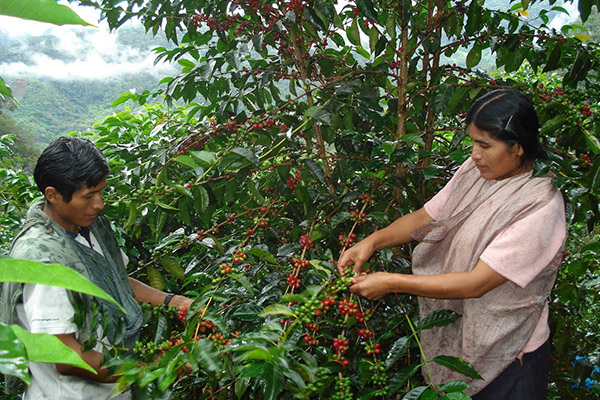The Central de Cooperativas Agrarias Cafetaleras de los Valles de Sandia (CECOVASA or La Central), was founded in 1970 by five cooperatives that joined together to export directly, to obtain better prices and to share costs; it now has 8 cooperatives grouping together 4581 producers. The Central exports more than 75% of coffee production from the Tambopata and Inambari valleys on the eastern slopes of the Andes in southern Peru. The production of both valleys represents 2% of the national total.
Cecovasa's members are Quechua and Aymara, from the high plateau of Lake Titicaca. This region, whose soils are not very fertile, is periodically affected by the El Niño phenomenon, which was and is the cause of migrations (such as the one that occurred in the 1930s in the Bolivian Yungas region, where they learned to cultivate the coffee that, twenty years later, gave rise to the Central plant). Thus, coffee, which was born in Ethiopia and spread from France and Holland, arrived at Cecovasa from Bolivia.
The Aymara civilisation mainly colonised the Tambopata valley, while the Quechua civilisation colonised the Inambari. The producers cultivate an average of two hectares of coffee plantations. Cecovasa's production area ranges from 800 to 2,000 metres above sea level, and one third of the coffee plantations are located in the buffer zone of the Bahuaja Sonene National Park. The harvest is concentrated between March and July, extending in the highest parts until November.
CECOVASA aims to promote the association, leadership and business excellence of its cooperatives and associated producers. To this end, it promotes business training and provides training services, technical assistance, credit, acquisition of inputs, brand development, certification, information, collection, processing and marketing of speciality coffees. With all this, it seeks to contribute to increasing incomes and improving the living conditions and quality of life of families.
VISION
"CECOVASA is an organisation of coffee producers in the Sandia Valley, supported by the values and principles of cooperativism, committed to the eradication of extreme poverty, the preservation of Andean culture and environmental sustainability, which bases its consolidation and business growth on the efficiency of its production and commercial processes and the originality and quality of its products".


